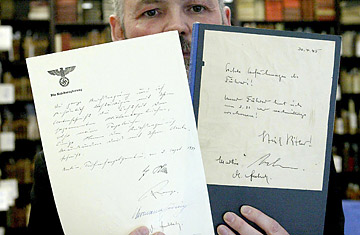
In 1983, German newsweekly Stern came out with an exclusive report on what seemed to be the most explosive diaries in history: the collected thoughts of Adolf Hitler. Procured by Stern staff reporter Gerd Heidemann, the documents had apparently been hidden away in East Germany by a mysterious Dr. Fischer after being recovered from an aircraft crash near Dresden in April 1945. The diaries passed three handwriting tests; the Times of London and Newsweek engaged historians Hugh Trevor-Roper and Gerhard Weinberg to examine the papers, with Trevor-Roper convinced of their authenticity.
But Stern, which bought the documents for some $6 million, made a critical error: fearing the sensational story would leak, they refused to allow any German experts on World War II to examine the diaries. Within two weeks of publication, the West German Bundesarchiv had exposed the Hitler diaries as "grotesquely superficial fakes" made on modern paper using 1980s-era ink and riddled with historical inaccuracies. The fallout ruined Trevor-Roper's reputation and cost editors at Stern, the Sunday Times and Newsweek their jobs. As for the diaries themselves, they turned out to be the work of notorious Stuttgart forger Konrad Kujau. Both Heidemann and Kujau went to trial and were each sentenced to 42 months in prison for forgery and embezzlement.